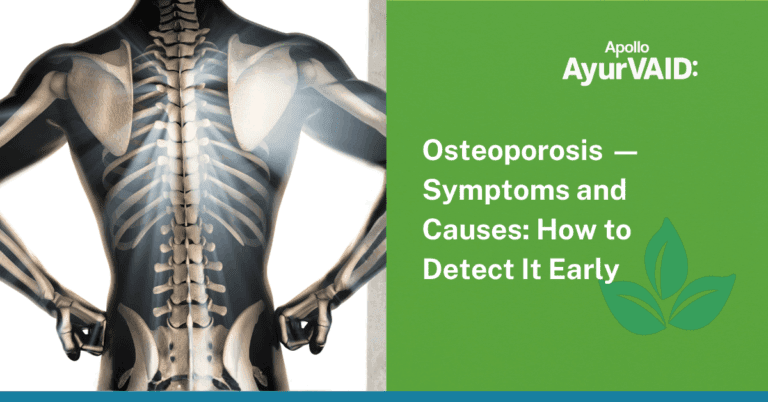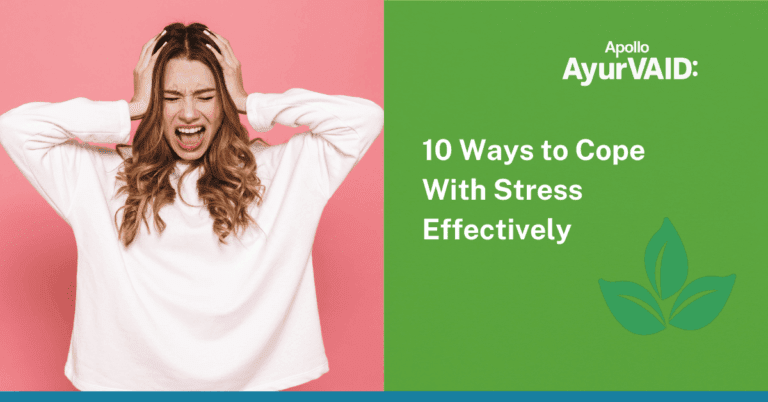Introduction
Gastro-oesophageal reflux (GER) is defined as the occasional retrograde flow of gastric contents into the oesophagus in healthy individuals. If this reflux occurs frequently or causes troublesome symptoms and complications, it is termed gastroesophageal reflux disease (GERD). The backflow of stomach contents that is irritating is a hallmark of GERD, characterized by a variety of uncomfortable symptoms. This blog discusses the symptoms of gastroesophageal reflux disease, what causes GERD, the different treatments available for gastroesophageal reflux disease, and it particularly emphasizes GERD treatment in Ayurveda.

What Causes GERD?
The following are a few major causes of GERD
- Lower esophageal sphincter abnormalities – The LES is a musculature-dependent valve thatalso prevents regurgitation of acid from the stomach into the esophagus. It gets weakened or relaxed without an appropriate cause from time to time, causing acid reflux and symptoms of gastroesophageal reflux disease.
- Hiatus hernia – Part of the stomach pushes through the diaphragm into the chest, disturbing the normal barrier for acid reflux.
- Delayed esophageal clearance or gastric emptying – Acid is usually cleared from the esophagus very quickly; however, when this process is slow, the acid remains longer in contact with the lining, resulting in heartburn.
- Increased intra-abdominal pressure – Resultant from obesity, pregnancy, chronic coughing or or any other conditions associated with increased abdominal pressure will also cause the stomach contents to push into the esophagus.
- Obesity and food habits – Irritating, spicy foods, fatty foods, acidic foods and excess weight are things that would relax the LES and make it worse.
- Smoking and alcohol – relax the lower esophageal sphincter, create more acid, and cause increased episodes of reflux.
- Stress- reduces digestion and increases stomach acid production, worsening the symptoms of GERD.
- Hormonal changes during Pregnancy – Increased progesterone tends to relax the LES, so higher gastrin tends to increase stomach acid while delaying gastric emptying and further predisposing to GERD.
In Ayurveda, GERD correlates with Amlapitta, caused by an imbalance of Pitta Dosha. A weak Agni (digestive fire) leads to Agnimandya (poor digestion), forming Ama (toxic waste). This undigested food in the Amashaya (stomach) vitiates Pitta Dosha, causing Amlata (acidity). Mental stressors like chinta (anxiety), krodha (anger), and bhaya (fear) further disrupt digestion and result in GERD symptoms.
Gastroesophageal Reflux Disease – Symptoms
GERD symptoms primarily include heartburn and regurgitation, which worsen with bending, straining, or lying down. Other common signs are water brash (excessive salivation), nighttime choking, pain, and difficulty swallowing. Atypical manifestations include chest pain resembling angina, asthma, chronic cough, hoarseness, and recurrent chest infections. If untreated, GERD can lead to complications like esophagitis, anemia, and esophageal stricture.
Ayurveda associates GERD with Amlapitta, presenting symptoms like Avipaka (indigestion), klama (fatigue), Utklesha (nausea), Vaktamla Udgara (sour eructations), Gaurava (heaviness), Hritkanthadaha (burning sensation in the heart and throat), and Aruchi (anorexia). Related conditions include Ajirna (indigestion), Annadravashoola (pain relieved by vomiting), and Parinamashoola (pain during digestion).
GERD Treatment in Ayurveda
Ayurveda treatment focuses on restoring the balance of the Doshas, improving Agni, and eliminating Ama through a holistic approach encompassing dietary modifications, lifestyle adjustments, herbal remedies, and sometimes, Panchakarma (detoxification therapies).
Panchakarma therapies cleanse and detoxify the body, balance the Pitta Dosha, and restore digestive health.
- Vamana (Emesis): It helps remove undigested food, mucus, and toxins from the upper digestive tract. It clears excess acidity, preventing sour and bitter belching, and improves the function of the esophagus by inhibiting excessive gastric secretions. It is particularly useful when GERD is accompanied by indigestion, nausea, and heaviness in the stomach.
- Virechana (Purgation): It is best suited in cases when excess Pitta, being a primary factor for acid secretion, is to be ejected from the body. It detoxifies the gut, regulates acid secretion, and ensures improvement in digestion, thus keeping recurrent heartburn and acidity at bay. Virechana also improves metabolism and aids in the breakdown and absorption of food.
- Vasti (Enema): It is known to specifically balance the Vata Dosha, also aids in balancing Pitta and stimulating digestion (Agni). The treatment reduces inflammation, improves gut motility, and prevents the buildup of toxins that cause acidity and reflux. Therefore, Vasti is beneficial in chronic cases of GERD consequence to digestive imbalances that lead to long-term discomfort and complications.
Dietary management is important in GERD treatment in Ayurveda. It emphasizes the consumption of light, easily digestible foods with cooling properties. Recommendations include:
- Foods to favor: White pumpkin, bitter gourd, matured ash gourd, most leafy vegetables (excluding fenugreek), wheat, old rice, barley, green gram, sugar candy, cucumber, gooseberry, dry grapes, black grapes, sweet lime, pomegranate, fig, and adequate fluids like pomegranate juice, lemon juice, amla juice, and medicated water with coriander seeds.
- Foods to restrict: Excessively spicy, sour, and salty substances, fried and junk food, garlic, onions, chilies, rice, curd, and sour fruits ….
Lifestyle modifications are equally crucial in managing GERD:
- Eating smaller, more frequent meals and avoiding eating close to bedtime ….
- Elevating the head of the bed.
- Avoid lying down immediately after meals and in the supine position. The left lateral position is recommended.
- Getting adequate sleep and rest.
- Practicing Yoga, Pranayama, and meditation to manage stress
- Avoiding smoking, alcohol, tea, coffee, and aspirin-like drugs
Conclusion
Managing GERD effectively requires a comprehensive understanding of its causes and symptoms from both modern and holistic perspectives. Ayurveda offers a wealth of knowledge and treatment modalities that focus on restoring digestive health and overall well-being through personalized dietary and lifestyle recommendations, along with the use of safe and effective herbal remedies. By integrating these principles and working closely with healthcare professionals, individuals can find sustainable relief from the discomfort of GERD and improve their quality of life. Embracing the wisdom of Ayurveda can provide valuable tools in the journey toward digestive harmony.

References
- Neha Yadav, Amarendra Kumar Singh. A Comprehensive Literary Review of Gastroesophageal Reflux Disease (GERD) in Ayurvedic Perspective. Ayushdhara [Internet]. 2023Sep.9 [cited 2025Mar.25];10(Suppl4):127-33. Available from: https://ayushdhara.in/
index.php/ayushdhara/
article/view/1323 - Smita Naram, Komal Gawali and Hemang Parekh (2024); MANAGEMENT OF GASTROESOPHAGEAL REFLUX DISEASE THROUGH AYURVEDA: A CASE STUDY Int. J. of Adv. Res. (May). 536-539
- Bhawana, A et al. (2023). Role of Ayurveda Modalities in the Management of Urdhwag Amlapitta (Gastro Esophageal Reflux Disease): A Critical Review. AYUSHDHARA. https://doi.org/10.47070/
- Waskar, R, Bhakare, R (2024). Ayurvedic Management of Gastroesophageal Reflux Disease (Urdhwag Amlapitta) – A Case Report. Journal of Natural Remedies. https://doi.org/10.
18311/jnr/2024/348955.Musale, P, Mankar, S (2023). A Review on Polyherbal Formulation Used in the Treatment of Gastric Acidity. Research Journal of Pharmacognosy and Phytochemistry. https://doi.org/10.52711/0975-4385.2023.00027
1. Mild or intermittent GERD: Occasional heartburn or regurgitation, usually treated with lifestyle modifications and antacids.
2. Moderate GERD: Occasional heartburn or regurgitation, somewhat more frequent than mild cases and bothersome, requiring prescription medication and endoscopy for mild oesophagitis.
3. Severe or refractory GERD: Heartburn or regurgitation on a daily basis and debilitating in nature often requiring other investigations like 24-hour pH monitoring and motility studies.






